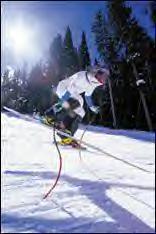|
When speed skier Ross Anderson reaches speeds of
more 120 mph there is a calm that sweeps his body, an inner nirvana that provides him spiritual satisfaction and
feeds his need for speed.
A Cheyenne-Arapaho/Mescalero Apache from Durango,
Anderson holds the distinction of being the world's fastest Native American in one of the most dangerous and dynamic
sports ever developed.
Terminal velocity is the speed, approximately 123
mph, in which a human being freefalls. "It's like falling from a plane," said the 27-year-old Anderson.
"Only we travel a lot faster."
 Anderson whose fastest recorded speed in competition is 137.86 mph is ranked 25th in the world
and 4th in the nation. Anderson whose fastest recorded speed in competition is 137.86 mph is ranked 25th in the world
and 4th in the nation.
"Speed skiing is the master of all skiing,"
said Anderson who strapped on his first pair at the age of 4. Brought up in a sports-oriented town, it was natural
and hereditary that Anderson would excel in competitive skiing. His father was a ski racer and worked with the
ski patrol in Durango surrounded by ski hills. "I grew up in competition my whole life," he said.
Anderson raced
downhill, moguls and the slalom until 1992 when a friend introduced him to speed skiing.
"He told me I had to give it a shot. I did
and I got hooked," Anderson said. Although he enjoyed downhill skiing, Anderson craved faster speeds and tougher
competition.
"I got bored. I got immune to the speed and
I wanted more."
Stu Young, from the Tulalit Band in Washington
state, has been speed skiing since 1987 and is considered a trailblazer in the "fastest non-motorized human
activity" sport in the world. Young placed third in the veteranís category in the 1998 World Championships.
He said Anderson has the potential to be one of the top 10 fastest skiers in the world.
"He's got a good heart and that goes a long
way in what we do. It's more than just physical. It takes every bit of being to be the best."
Anderson considers Young a role model who broke
down the walls of possibility and opened the sport up for other Native Americans.
An introductory sport in the 1992 Winter Olympics,
it calls for strength both physical and mental. It combines all skiing abilities from balance and speed to sheer
strength and mental focus.
"I literally enter a zone," said Anderson
who considers it a spiritual sport where he "gets in touch with Mother Nature."
A recognizable face on the European tours, Anderson
said the sport is bigger overseas than in North America but, with recent televised events here, the sport is catching
on.
Speed skiing will be an official competition in
the 2006 Winter Olympics in Italy. During his first competitions overseas Anderson said a lot of racers gave him
"a double-take" because they weren't used to seeing a Native American on the slopes. It was only a matter
of time before they inquired about his culture and language. Anderson doesn't mind sharing information about the
culture with the Europeans who have an insatiable interest in North American Indians.
He has signed on with the Purgatory Ski Resort
in Durango as its on-hill ski celebrity and represented it in competitions across the world.
Once a year Anderson puts on a Ski with Ross Anderson
Day at the resort where students from regional Native American schools get a chance to ski with the role model.
For many school children, who can't ordinarily afford to ski, its an opportunity to learn a new sport.
"It ís a positive thing to do. It gives
them an opportunity to experience a different life and expand their minds a little."
As Anderson strives to break the speed record,
and prepares for the 2006 Olympics, he will continue to race at unfathomable speeds soothing his spirit and inner
speed demons.
Ross Anderson
http://www.rossanderson.org
|

![]()